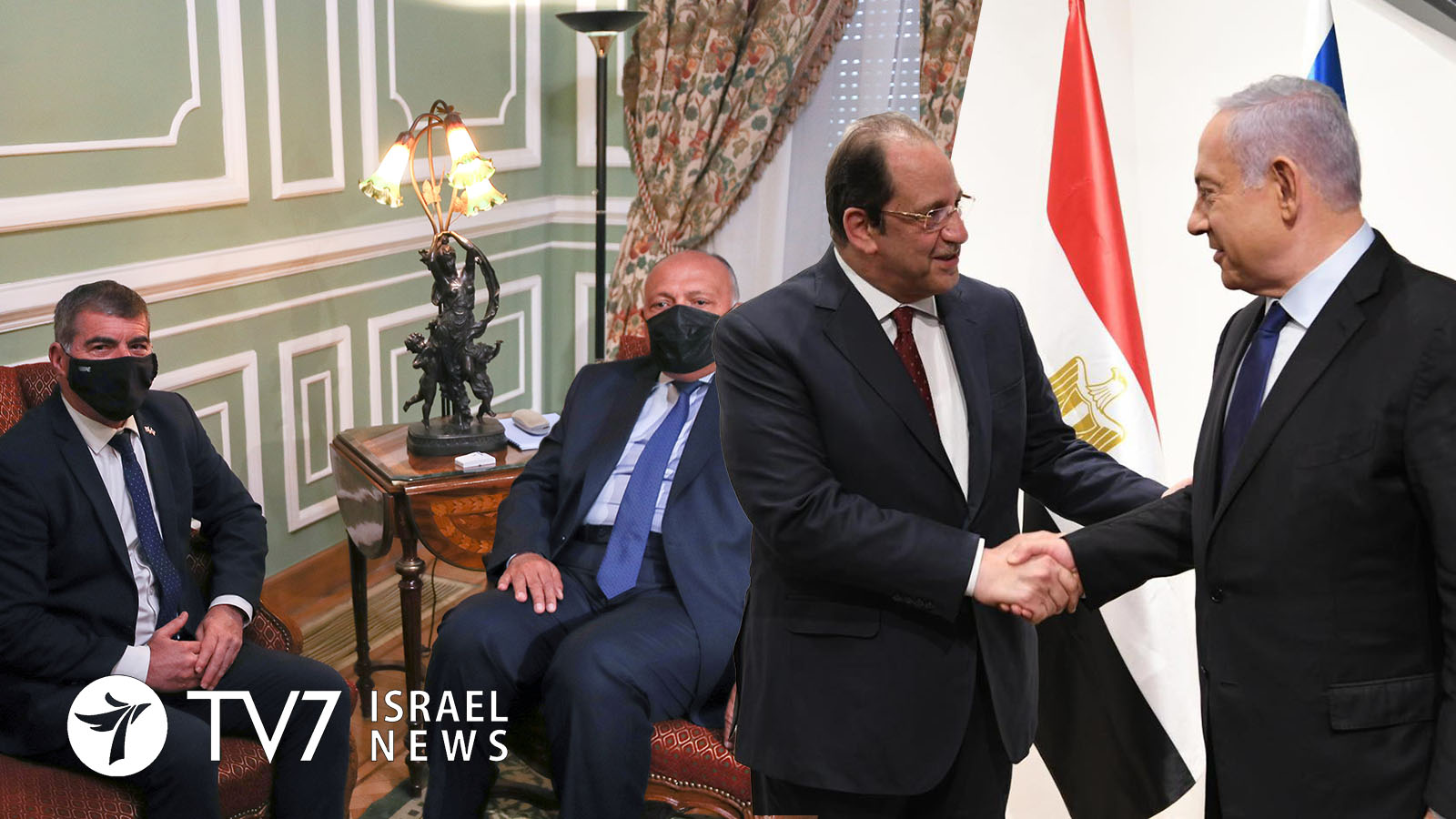There has been a flurry of diplomatic and security activity between Israel and Egypt in recent days, heavily concentrated on maintaining calm with the Hamas-controlled Gaza Strip, which borders both countries.
Cairo helped broker the 21 May truce to halt the worst fighting in years between Jerusalem and Gaza City, and is working with Washington and other regional partners to expand it into a more permanent ceasefire.
In 1979, Egypt became the first Arab country to sign a peace treaty with the Jewish State.
Israeli Prime Minister Benjamin Netanyahu hosted Director of the Egyptian General Intelligence Directorate (EGID) Maj. Gen. Abbas Kamel and a delegation of senior officials in Jerusalem yesterday.
According to a statement by the Prime Minister’s Office, the two men discussed “mechanisms and processes to prevent the strengthening of Hamas,” particularly through the siphoning off of international humanitarian aid intended for Gazan civilians.
11 days of intense crossfire broke out when terror groups in Gaza began the firing of 4,400 rockets at Israeli cities – including Jerusalem – on 10 May. Between 25-30% of the missiles are estimated to have misfired or fallen short, injuring Gaza residents. The IDF retaliated with pinpoint strikes on Hamas military targets, underground terror tunnels and militant commanders.
13 people were killed in Israel, which is funding its own efforts to repair damage caused by the Palestinian rockets and missiles.
There has been an outpouring of international pledges for hundreds of millions of dollars from Egypt, the United States, Qatar, the United Nations and others for reconstruction efforts in Gaza, where Palestinian officials say 248 people were killed.
During his meeting with Maj. Gen. Kamel, Prime Minister Netanyahu reiterated Jerusalem’s demand that Hamas immediately release captive Israeli civilians Avraham “Avera” Mengistu and Hisham al-Sayed, both of whom reportedly suffer mental impairment, held incommunicado since crossing into Gaza of their own accord in 2014-2015; and the remains of 2 IDF soldiers, Sergeant First Class Oron Shaul and Second Lieutenant Hadar Goldin, who were killed in action during the 2014 Gaza war. Egypt’s state run Middle East News Agency (MENA) reported on Sunday that President Abdel Fattah al-Sisi has directed government officials to continue efforts and meetings to work on the issue of prisoners and missing people between Israel and Hamas.
Netanyahu and Kamel also “praised the ties and understandings, and the countries’ joint effort on various security and diplomatic issues,” including the “strengthening cooperation between Israel and Egypt” in addition to other regional issues.
Intelligence Minister Eli Cohen and National Security Council (NSC) head Meir Ben-Shabbat also participated in the Jerusalem meeting, the latter of whom also held “a lengthy” private meeting with his Egyptian counterpart on the aforementioned issues ealier.
Israeli Defense Minister Benny Gantz later briefed Lt. Gen. Kamel and his senior delegation on the principles of defense policy formulated by the Israeli security establishment.
According to a Ministry of Defense statement obtained by TV7, Lt. Gen. (res) Gantz “further expressed his appreciation for Egyptian efforts to restore quiet and stability to the region, as well as for the special defense ties between the countries, and asked that Kamel convey his appreciation to the president of Egypt as well.”
Israel’s top defense official was joined by Director General of the Israeli Ministry of Defense, Amir Eshel, and Head of the Political-Military Bureau at the Israeli Ministry of Defense, Zohar Palti.
Kamel also met Palestinian President Mahmoud Abbas in Ramallah on Sunday, to deliver a message from Egyptian President Sisi affirming Cairo’s support to Palestinians and Abbas, MENA reported.
Meanwhile, Israeli Foreign Minister Gabi Ashkenazi traveled to Cairo yesterday – in the first such visit in 13 years – for talks with his Egyptian counterpart. In addition to pressing Israel’s demand for the release of the Israeli captives by Hamas, he also discussed ways to secure a permanent ceasefire with Gaza and help in rebuilding Gaza.
In tweets after the meeting, Ashkenazi called Egypt an important regional ally committed to peace in the region, adding: “We all need to act to prevent strengthening extremist elements that threaten regional stability, and to ensure the return home of the missing persons and prisoners held by Hamas.”
Egypt’s Foreign Minister Sameh Shoukry stressed the need to build on Israel’s truce with Hamas by “stopping all practices that lead to escalation,” according to Cairo’s Foreign Ministry, including “the need to take into account the special sensitivity associated with East Jerusalem, Al-Aqsa Mosque and all Islamic and Christian holy sites.”
Clashes between Israeli security forces and Palestinians around the mosque during the Muslim holy month of Ramadan helped trigger the recent Gaza conflict.
Cairo also reiterated its call for creating appropriate circumstances to revive talks between Israelis and Palestinians toward a Two-State solution to their conflict, added the statement.
Egypt’s diplomatic efforts come on the heels of top-level reengagement from United States and the United Kingdom, including last week’s regional visits by Secretary of State Antony Blinken and Foreign Secretary Dominic Raab, respectively.
